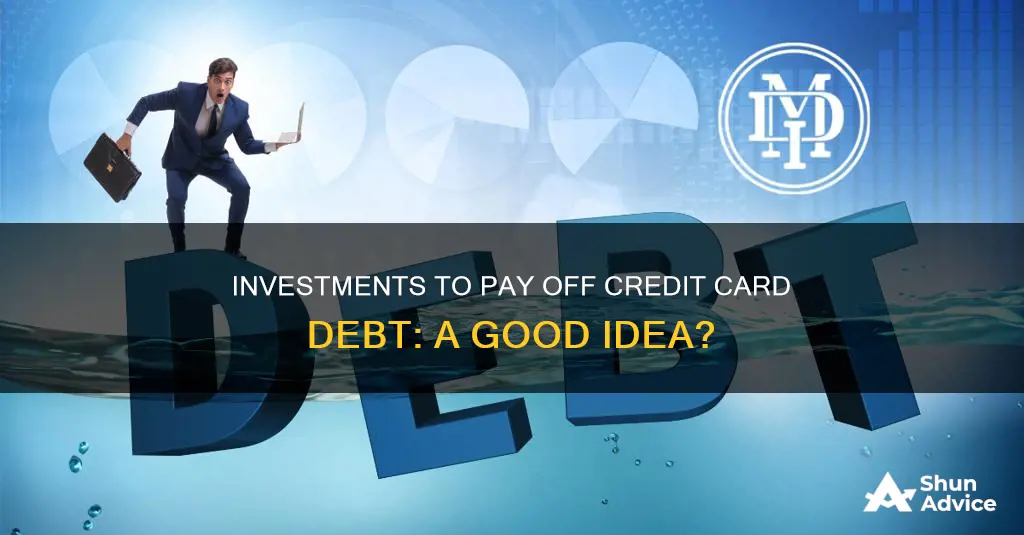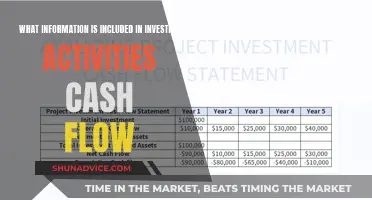
Whether you should use your investments to pay off credit card debt depends on your individual circumstances. While it may be tempting to pay off your debt as quickly as possible, you may want to consider other factors, such as the interest rates on your debt, your ability to stay on top of debt payments, and your proximity to retirement.
If you have high-interest credit card debt, it is generally recommended to focus on paying off that debt as soon as possible. Credit cards often carry high-interest rates, and the average interest rate on credit cards can be around 20% or higher, which can quickly add up. However, if you have investments that are earning you a higher return than the interest rate on your credit card debt, it may make sense to continue investing.
Additionally, using your investments to pay off credit card debt may come with financial implications, such as capital gains tax. If you sell investments that you have held for less than a year, you may owe a significant amount in taxes, which can eat into your returns.
Before making a decision, it is important to weigh the potential benefits and drawbacks of using your investments to pay off credit card debt. It may be helpful to consult with a financial advisor or planner to determine the best course of action for your specific situation.
| Characteristics | Values |
|---|---|
| Interest rates on debt | If the interest rates on your debt are higher than your potential investment returns, it may be better to pay off debt first. |
| Credit utilisation | If you are using a large portion of your available credit, it may be better to pay off debt first. |
| Employer 401(k) match | If you are already investing enough to qualify for a full employer 401(k) match, it may be better to pay off debt first. |
| Debt management | If you are struggling to manage your debt, paying late or missing payments, it may be better to pay off debt first. |
| Retirement timeline | If you are nearing retirement and want to pay off high-interest debt, it may be better to pay off debt first. |
| Investment returns | If your potential investment returns are likely to be higher than the interest rates on your debt, it may be better to invest first. |
| Consistency of payments | If you are managing your current debts well and making on-time payments consistently, it may be better to invest first. |
| Retirement debt | If you are nearing retirement and don't have high-interest debt, it may be better to invest first. |
What You'll Learn

Weigh up the interest rates
Weighing up the interest rates on your debt and investments is a key consideration when deciding whether to use investments to pay off credit card debt. Here are some detailed insights to help you make an informed decision:
Understand the Interest Rate Dynamics
The primary factor in your decision-making process should be the interest rates associated with your credit card debt and potential investment returns. Compare the interest rate on your credit card debt with the expected returns on your investments. If your credit card interest rate is higher than your expected investment returns, it usually makes more sense to prioritize paying off the credit card debt first.
For example, if your credit card charges a 20% interest rate and your investments are expected to yield a 10% return, you will be losing more money to interest payments than you would gain through investing. In such cases, it is generally advisable to use your investments to eliminate the high-interest credit card debt.
Evaluate the Risk and Volatility
It's important to consider the volatility and risk associated with your investments. Investments like stocks or mutual funds can be volatile, with values fluctuating from year to year. If you're investing in the stock market, there's a chance your investments might decrease in value at the same time your credit card debt continues to accumulate interest. This could put you in a worse financial position.
On the other hand, some investments offer guaranteed interest rates, such as bank certificates of deposit (CDs) or U.S. Treasury bills. However, these tend to have lower rates of return compared to the interest rates charged by credit card companies.
Consider Your Risk Tolerance
Your risk tolerance plays a crucial role in deciding whether to invest or pay off debt. If you are comfortable with the potential ups and downs of the market and can handle the risk of losing money on your investments, then investing may be a viable option. However, if the thought of market fluctuations keeps you up at night, you may be better off prioritizing debt repayment.
Assess Your Financial Goals and Circumstances
Your overall financial goals and circumstances should also factor into your decision. If you're nearing retirement, for instance, it's generally advisable to prioritize paying off high-interest credit card debt. Entering retirement with less debt can provide more financial stability and ensure your retirement savings aren't eroded by interest payments.
Additionally, consider your ability to stay on top of debt payments. If you're struggling to manage your debt, making late payments, or your credit score is suffering, it's often better to focus on debt repayment rather than investing.
Explore Alternative Options
Before using your investments to pay off credit card debt, explore alternative options that could help you manage your debt more effectively. These may include:
- Balance transfer credit cards: These cards offer promotional periods of 0% interest, allowing you to pay down your balance without incurring additional interest charges.
- Debt consolidation loans: You can borrow money from a lender to pay off your credit card debt, leaving you with a single debt to focus on, ideally with a lower interest rate.
- Debt management plans: Working with a debt counsellor or a reputable debt relief company can help you negotiate lower monthly payments and reduced interest rates, making it easier to manage your debt.
In conclusion, when deciding whether to use investments to pay off credit card debt, carefully weigh the interest rates and returns, consider the risks and volatility, assess your financial circumstances and goals, and explore alternative debt management strategies.
Understanding Cash Equivalents in Your Investment Portfolio
You may want to see also

Consider your credit score
Your credit score is a number that can be very important if you want to borrow money in the future, such as for a mortgage or a car loan. It can also affect other aspects of your life, such as the premiums you'll pay for insurance, whether a landlord will rent to you, and even whether an employer will hire you.
Carrying a lot of debt can affect your credit score, which can lead to wider-ranging consequences than you might think. Even if you haven't maxed out your credit cards, keeping a high credit utilisation ratio (the money you owe on your credit cards, divided by your total credit card limit) can have a negative effect on your credit score.
A bad credit score can lead to higher interest rates and fewer loan options. It can also make it harder to find housing. Experian, one of the three big credit reporting agencies, recommends keeping your credit utilisation ratio at 30% or lower.
Ongoing debt negatively impacts your credit score in other ways, too. When you are using too much of your available credit lines, your credit score declines. The amount of credit you're using relative to the amount available to you is known as your credit utilisation ratio.
"For instance, if you have a $1,000 credit limit and you use $500 of it, then you have a credit usage ratio of 50%," explains Katie Ross, executive vice president for the nonprofit national financial education organisation, American Consumer Credit Counseling (ACCC). "The higher your ratio is, the riskier you appear to creditors."
Why do you appear risky to creditors exactly? Because having a high credit utilisation ratio can be a sign that you're relying too heavily on credit to make ends meet.
A good credit utilisation ratio is 30% or under, but aiming lower is even better, as this ratio also strongly influences your credit scores; it accounts for 30% of your FICO score and 20% of your VantageScore. Lenders often consider these scores to help determine if you qualify for financing.
Lower credit usage not only shows you aren't over-relying on credit, but it often correlates with higher credit scores. If you're only using 10% of your credit versus 30%, for example, lenders may be more likely to approve you for new loans or higher credit limits.
If you're in a lot of debt, you might be tempted to pay it off as quickly as possible, especially if you're paying a lot in interest. But if you fail to save or invest during this time, you may have a net worth of zero when you eventually become debt-free.
Weighing up the pros and cons
There are several good arguments for choosing to pay down debt rather than investing. The first, as mentioned above, is that you might come out ahead if your debt carries a relatively high-interest rate. That's especially true with credit card debt. The average interest rate on credit cards tracked in Investopedia's credit card database was 24.37%, as of April 2024.
Another solid reason to pay down debt involves your credit score. Paying off debt, particularly if you have a lot of it, can be a smart move for that reason alone.
As with investing, psychology comes into play here, too. If you're losing sleep over your debts, then you could be better off repaying them—even if you might get a better return on your money by investing.
However, there are some potential consequences of using your investments to pay off debt. When you sell investments in a taxable brokerage account, you'll need to pay capital gains tax on the gains you've realised in the sale. For positions you've held for less than a year, the tax rate is your ordinary income tax rate, while positions held longer than a year benefit from a lower tax rate.
Even so, the amount you pay in tax will eat into the potential savings you'll get from paying off your credit card balance. If you're thinking about taking money from a retirement account, you may have to pay income taxes and a 10% penalty on your withdrawal, which combined could neutralise the interest savings entirely.
Other options
If you have good credit, you may be able to get approved for a balance transfer credit card. These cards offer introductory 0% APR promotions, allowing you to pay down a large chunk or even all of your debt without paying another dime in interest.
If you have good credit, you can also opt for a personal debt consolidation loan. While these loans don't offer a promotional APR, they can give you something a credit card can't: a fixed repayment term. On average, personal loans have lower interest rates than credit cards, and if your credit is in great shape, you might even qualify for a single-digit interest rate.
Understanding Non-Cash Investing and Financing Activities
You may want to see also

Assess your risk tolerance
When deciding whether to use investments to pay off credit card debt, assessing your risk tolerance is an important factor to consider. This involves evaluating your comfort level with taking on financial risk and understanding the potential impact on your investment portfolio. Here are some key points to consider when assessing your risk tolerance:
- Interest Rates and Returns: Compare the interest rates on your credit card debt with the potential returns on your investments. If your credit card interest rates are high, typically above 4%, it may be more beneficial to prioritize paying off the debt. Credit card interest rates often exceed average investment returns, so you may be losing more money to interest than gaining through investments.
- Volatility and Risk: Investments can fluctuate in value, and some are more volatile than others. Consider your tolerance for risk and the potential impact on your portfolio. Are you comfortable with the possibility of your investments decreasing in value due to market changes? Diversification can help mitigate risk, but it's important to understand the level of risk associated with your investments.
- Opportunity Cost: Assess the opportunity cost of using your investments to pay off debt. Consider what your investment goals are and how using those funds to pay off debt might impact your ability to reach those goals. For example, if you're investing for retirement, weigh the benefits of keeping your investments for the long-term growth potential.
- Tax Implications: Selling investments may trigger capital gains tax, which can reduce your overall returns. Consider the tax implications of liquidating your investments to pay off credit card debt, especially if you've held the investments for less than a year, as short-term capital gains tax rates can be higher.
- Long-term Financial Goals: Evaluate your long-term financial goals and how using investments to pay off debt aligns with them. If you're saving for retirement, for example, consider the impact on your retirement timeline and the potential loss of compound interest by withdrawing funds early.
- Emotional and Psychological Factors: Financial decisions often involve emotional and psychological aspects. Consider whether the stress and anxiety associated with credit card debt are impacting your overall well-being. Weigh the potential relief of being debt-free against the risk and uncertainty of staying invested.
By assessing your risk tolerance and considering these factors, you can make a more informed decision about using investments to pay off credit card debt. It's important to seek professional financial advice and thoroughly evaluate your personal circumstances before taking any action.
Investing Cash Flow: Exploring Other Items
You may want to see also

Think about your retirement timeline
When deciding whether to use your investments to pay off credit card debt, it's important to think about your retirement timeline. If you're close to retirement age, it's generally not advisable to withdraw from your retirement savings to pay off credit card debt. Early withdrawals from retirement accounts, such as 401(k)s or IRAs, typically incur penalties and taxes, which can significantly reduce the amount of money you have available for debt repayment. For example, withdrawals from 401(k) accounts before age 59½ are usually subject to a 10% penalty and income taxes.
Additionally, by withdrawing money from your retirement savings, you're missing out on potential market gains and future compounding effects. The stock market has historically produced average annual returns of over 10%, and pulling your money out of investments means losing out on these potential gains.
If you're further away from retirement, you may have more flexibility in using your investments to pay off credit card debt. However, it's still important to consider the opportunity cost of doing so. Even if you're not approaching retirement age, withdrawing money from your investments can disrupt your portfolio's allocations and impact your long-term financial goals.
Instead of withdrawing from retirement savings, you could consider other options to pay off credit card debt. These include balance transfer credit cards, debt consolidation loans, negotiating lower interest rates, or using non-retirement investments, such as stocks, bonds, or cryptocurrencies.
In summary, when thinking about your retirement timeline, it's generally advisable to avoid using retirement savings to pay off credit card debt if you're close to retirement age due to penalties, taxes, and lost investment opportunities. If you're further from retirement, you may have more flexibility, but it's important to carefully weigh the potential benefits against the opportunity cost of reducing your investments.
HSA Investment or Cash: Which Option is Better?
You may want to see also

Calculate the opportunity cost
Opportunity cost refers to the value of the next best alternative that you give up when making a decision. It is a fundamental concept in economics that helps individuals and businesses evaluate the relative costs of different choices.
Step 1: Identify Alternatives
List all possible options available. For example, consider using investments to pay off credit card debt or keeping the investments and finding another way to pay off the debt.
Step 2: Determine Potential Benefits
Estimate the expected returns or benefits from each alternative. For using investments to pay off credit card debt, the benefit would be the amount of debt paid off and the interest saved. For keeping the investments, the benefit would be the potential investment returns.
Step 3: Evaluate Costs and Benefits
Assess the costs associated with each option. This includes direct costs, such as investment amount, and indirect costs, such as potential risks. Using investments to pay off credit card debt may incur capital gains tax, depending on how long the investments have been held. It may also result in lost future earnings and disruption to your investment portfolio.
Step 4: Compare the Benefits
Calculate the potential benefits of each alternative. The opportunity cost is the difference in returns between the chosen option and the next best option. In this case, it would be the difference between the interest saved by paying off the credit card debt and the potential investment returns.
Step 5: Make an Informed Decision
Choose the option with the higher net benefit. If the potential investment returns outweigh the interest saved by paying off the credit card debt, then it may not be the best decision to use your investments for debt repayment.
It is important to note that this analysis assumes that you have non-retirement investments available to pay off your credit card debt. As mentioned in the sources, it is generally not advisable to use retirement accounts for debt repayment due to the associated penalties and taxes.
Cash Flow Statement: Understanding Investment Changes
You may want to see also
Frequently asked questions
It depends on your circumstances. If you have high-interest credit card debt, it's generally recommended to focus on clearing this first. However, there are some alternative options to consider before cashing out your investments.
Credit cards often carry high-interest rates, so you could be losing more money to interest than you would gain through investing. Clearing your credit card debt first can also improve your credit score and reduce financial stress and anxiety.
You will need to pay capital gains tax on the money you make from selling your investments, which can be as high as 37% if you've held those investments for less than a year. You will also miss out on future investment earnings.
Yes, you could pause contributions to your investments and redirect that money towards paying off your credit card debt. You could also consider taking out a loan through a portfolio line of credit, which gives you access to your investment money without triggering taxes.
Yes, you should avoid cashing out your retirement accounts. Withdrawing from your 401(k) early will incur income taxes and a 10% penalty fee, which could have a significant impact on your long-term financial goals.







